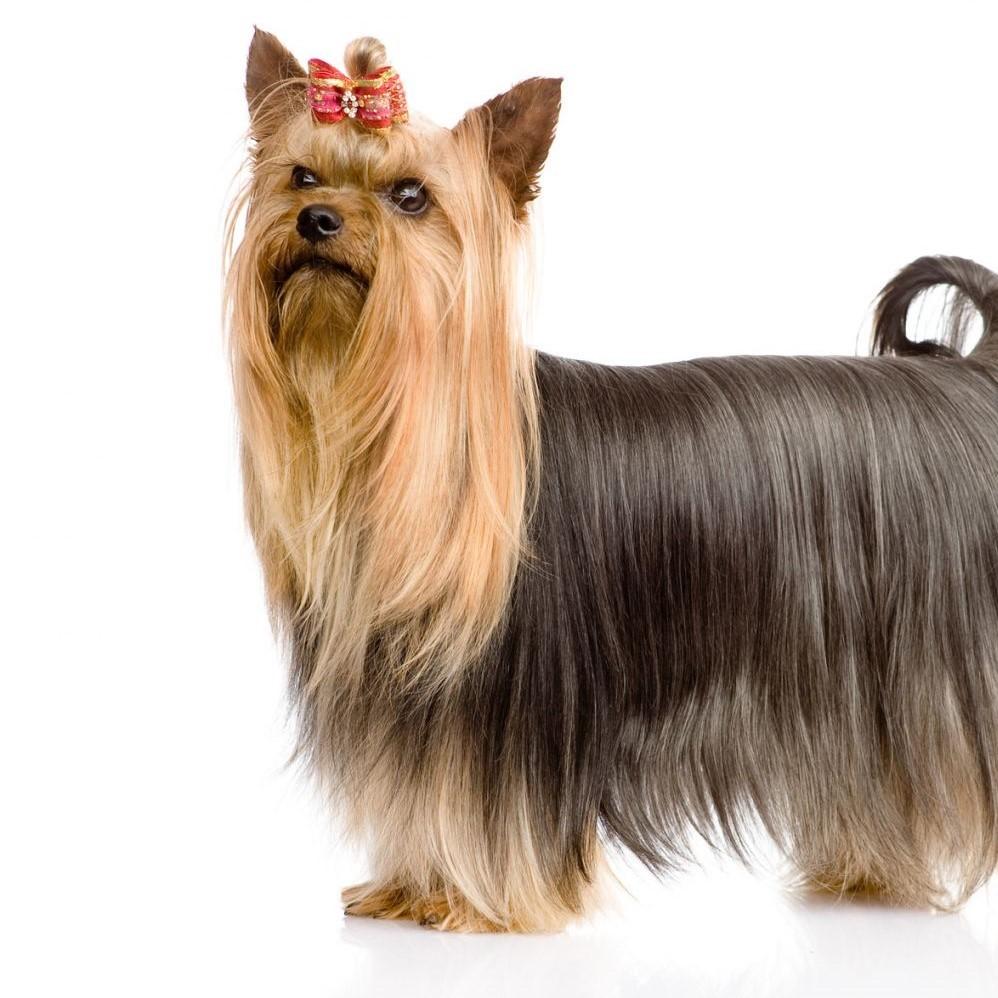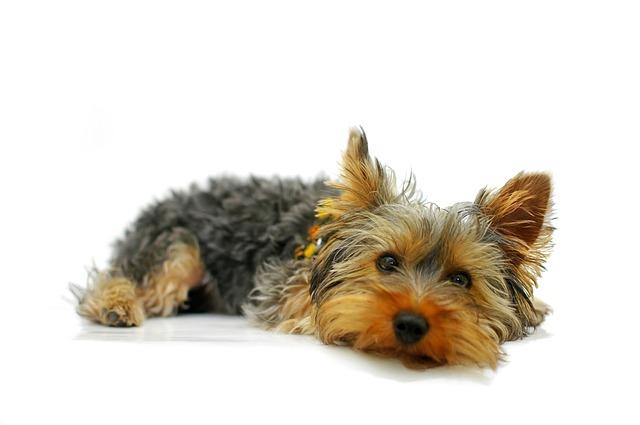Yorkshire terrier
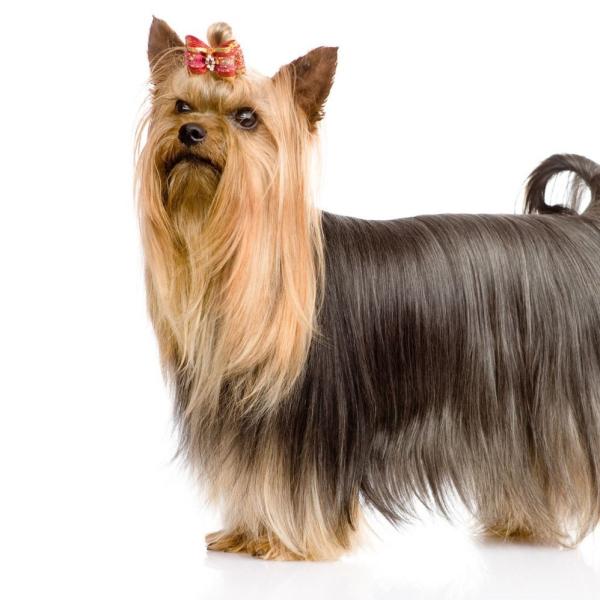
The Yorkshire terrier is a small dog or toy dog. If you are thinking of adopting one, it is very important that you first consider their characteristics and needs.
Knowing what food they need, the size they will reach as an adult or how to carry out their training are some of the basic things you should be clear on. Remember that a dog can accompany you for many years and that you are responsible for their welfare.
Whether you are thinking of adopting an adult Yorkshire or a puppy, here you will find the info to help you decide
- Europe
- United Kingdom
- Group III
- 5-14
- 14-18
- 18-22
- 22-27
- 27-31
- More than 31
- 2-7
- 7-22
- 22-55
- 55-100
- 100-220
- 8-10
- 10-12
- 12-14
- 15-20
- Low
- Meidum
- High
The origin of the Yorkshire terrier
The Yorkshire terrier appeared for the first time in the nineteenth century. This was when breeders began to develop a small breed of terrier, suitable for the hunting of rats. It was not until 1860 when the Yorkshire terrier we now know and love was officially presented in contests. It is believed that they descend from the English toy terrier, the Skye terrier or the dandie dinmont tierrer. However, its origin is not entirely clear.
They were an easy breed to care for and educate, with very beautiful physical characteristics and not at all aggressive with people. They were perfect for any type of family since at that time they were one of the most "economic" breeds that existed.
As we have been explaining, the Yorkshire terrier was used for the removal of rats. In spite of its diminutive size, it was well known that the Yorkshire terrier of the miners killed these rodents without fear. They were so popular that they began to participate in diverse "sports" related to the death of the rats.
Later it was the British bourgeois who found in the Yorkshire terrier, a sweet and beautiful companion dog. So, they began to stop using them in the hunting of rodents. However, the history of Yorkshire as a rat hunter still accompanies them as they are great at identifying pests.
Physical Characteristics
The Yorkshire terrier is a small or miniature dog. Sometimes also referred to as a "toy" dog, since there are records of a terrier weighing a single kilogram. Even so, they average weight of 3.1 kg when they reach adulthood. On the other hand, there have been Yorkshires of up to 7 kg. The size they reach will depend directly on their parents. The physical characteristics of the Yorkshire terrier are determined by the official standard. They have the following peculiarities of hair, size or types:
The Yorkshire has a compact body, with abundant medium-long hair. Their hair is straight, shiny, silky and combines the different shades: black, fire and dark blue steel. They are also popular for being hypoallergenic, so are suited for people with allergies. losing little hair and retain certain properties in your dermis does not usually cause allergic reactions easily. Their hair is easy to comb and take care of generally.
Finally, their ears. The official standard explains that they should end up in tip, keeping always raised as if the dog was alert. Well, if this is not your case and your Yorkshire shows the fallen ears do not hesitate to visit our article to raise the ears of your Yorkshire.
Character
The Yorkshire terrier stands out as an alert, intelligent and very lively dog. It is an excellent breed to live with all kinds of families as it adapts beautifully to any environment. One of their traits that may bother you is that they can adopt the habit of barking a lot. This is because they are watchful and alert dogs by nature. If that is not to your liking you should think of other breeds that bark less.
Other characteristics of this breed may be their overprotective and defiant attitude. This can be surprising in a small breed. You must be very clear that training a Yorkshire terrier must start from the puppy stage with the socialization process. This is so you can enjoy a sociable, trained and mentally healthy adult dog. Usually we speak of a very affable dog and attached to their relatives, easy to manage and really very affectionate. They are perfect for any family.
Caring for a Yorkshire terrier
The Yorkshire is a dog that will not need much care. However we will take into account some general details that will help you keep them happy, clean and beautiful for longer.
The first and most important will be the combing our dog on a regular basis. Do this at least every two days because their long coat is susceptible to entanglement and accumulating dirt. In addition, if we do not try to avoid the appearance of knots then it will be much more complicated to eliminate them.
The tremors (or shakes) that accompany the small body of a Yorkshire terrier are common, either because of cold or stressful situations. It will be important to prevent them from being cold by using clothes for small dogs and protecting them from rain.
Bathing a Yorkshire terrier is also very important to keep their hair dandruff free; another worrying factor for allergy sufferers. The regularity with which we must bathe our Yorkshire Terrier is usually about two weeks. But, that will depend on the particular dog, the length of the hair or how dirty they get in the park.
Training a Yorkshire terrier
The training of the Yorkshire Terrier will start from its socialization. It is very important that you let them meet other people, dogs, vehicles and objects of all kinds. This is so they won't develop fears, phobias or aggression in their adulthood. Although it is great if your dog knows many people and animals, you must make sure that this process is a positive one. Avoid scares, aggression or discomfort at all costs.
After its socialization stage, the Yorkshire must be initiated in the training, either in group or individually at home. It is very important that they learn the basic commands such as sit down, stay and come. This is to ensure they stay safe in the city and avoid other dangerous situations.
In addition to this, practicing obedience with your dog will help you forge a good relationship with him. Although it sounds strange it will also be fundamental to add different types of games in your usual routine. This allows them to relieve tension and burn the accumulated energy. Using teething, a Kong or other tools will be very positive for your Yorkshire.
Health of a Yorkshire terrier
A Yorkshire terrier can accompany us for a long time, living between 15 and 18 years. This is only if you care for them well to prevent diseases typical of the breed. Here are the most common ones so that you can detect them in time: patellar dislocation, spinal problems or congenital hydrocephalus.
In addition to degenerative or hereditary diseases, Yorkshires can suffer dislocation problems. This usually happens if they play with children or other large dogs that can exert too much force on them. Explain well to your children how to behave, because they are a small and delicate animal.
Yorkshire terrier photos








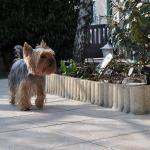













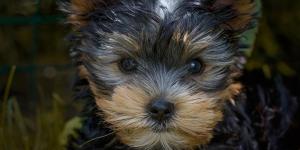
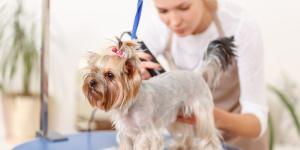



 How do you adopt ?
How do you adopt ?
